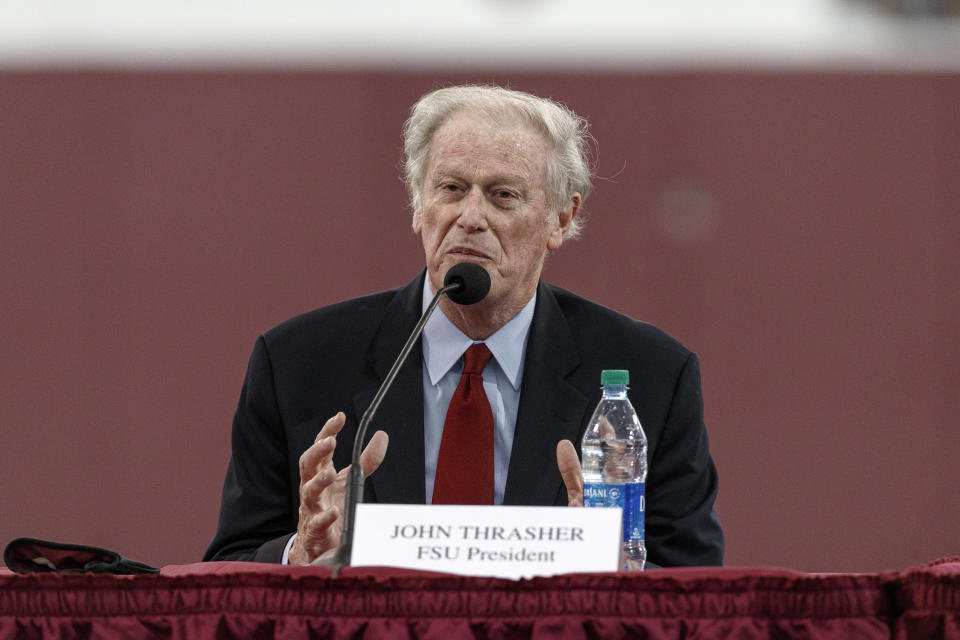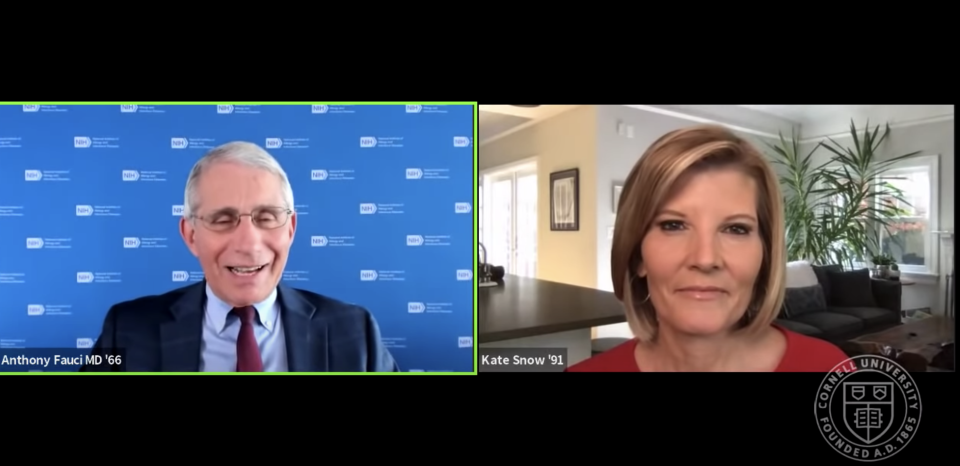School Report Card: This week, sorority sisters are forced to quarantine in a basement and FSU president tests positive for COVID-19

Students are headed back to class amid the coronavirus pandemic, and to keep you posted on what’s unfolding throughout U.S. schools — K-12 as well as colleges — Yahoo Life is running a weekly wrap-up featuring news bites, interviews and updates on the ever-changing situation.
Florida State University president and his wife test positive for COVID-19
John Thrasher, president of Florida State University, and his wife, Jean Thrasher, have tested positive for COVID-19, the school announced on Tuesday. Both received their diagnosis early in the week, after Jean was hospitalized for an unrelated condition. The couple are isolating at home and feeling well.
“President Thrasher is regularly tested for COVID-19 and tested negative as recently as Friday,” reads a statement sent to Yahoo Life. “With that information, Thrasher attended Saturday’s football game and took appropriate precautions. Mrs. Thrasher was not in attendance.” FSU officials are working with public health leaders on contact tracing, and those previously in close contact have been urged to be tested. Some of Thrasher’s colleagues were tested, and received negative results.
On Wednesday, Amy Hecht, the university’s vice president for Student Affairs, said in a memo that due to the school’s declining positivity rate, FSU will now allow groups of up to 50 people gather indoors and outdoors. (On Aug, 26, indoor and outdoor student-sponsored events were limited to a maximum of 10 people).
FSU, which began holding classes (mostly online) on Aug. 24, has reported 1,532 positive cases among employees and students in data collected between Aug. 2 and Oct. 3 (the latest available figures on the university dashboard). To date, Florida has recorded 728,921 positive cases, and many schools have opened for in-person instruction.
Last week, another university president tested positive — Rev. John Jenkins of the University of Notre Dame in South Bend, Ind., was diagnosed with COVID-19 after a Sept. 26 White House nomination ceremony for Judge Amy Coney Barrett. Jenkins told the community that he “failed to lead by example,” while a student petition demanded his resignation. According to the New York Times, at least eight White House attendees have COVID-19, including President Trump and first lady Melania Trump.
Syracuse University identifies emerging cluster of COVID-19 cases from “off-campus gatherings”
Syracuse University in New York has pinpointed an “emerging cluster” of positive COVID-19 cases, the school said in a Tuesday press release. The university, which offers online, in-person and hybrid courses, identified 45 positive cases that appear to have stemmed from one or more off-campus gatherings. The university began classes on Aug. 24 but has been tracking cases since Aug. 2, when students arrived on campus. Since then, it’s recorded a total of 159 cases, both active and recovered.
According to the CDC, a cluster is “an unusual aggregation, real or perceived, of health events that are grouped together in time and space and that are reported to a health agency.”
The school has instructed those who attended a party at a specific apartment complex on Walnut Avenue to shelter in place. “The overwhelmingly positive and selfless behavior exhibited by the vast majority of our students to this point in the semester makes our current situation all the more disappointing,” reads the release.
The university also suspended or moved online all in-person student activities, reduced gathering maximums from 25 to five people and encouraged fraternities and sororities to ban visitors.
More serious measures were taken, too: Any student leaseholder or roommate living in an off-campus home where a party violates university directives to limit on- and off-campus gatherings to five people or less (who don’t live together) will be reviewed and disciplined via the Office of Student Rights and Responsibilities. “All students have to commit to the Code of Student Conduct, including those who live off campus,” a university spokesperson tells Yahoo Life.
The school is also increasing patrol presence in university neighborhoods known to host gatherings, “with a shift from education to enforcement.” The spokesperson tells Yahoo Life, “There should be no questions about behavior expectations at this point in the semester.”
Sororities at the University of Washington are reportedly quarantining COVID-positive students
With 225 positive cases reported this week among 16 fraternities and sororities at the University of Washington in Seattle (and after a summer outbreak among 218 Greek community members), some have taken safety matters into their own hands. Sorority sisters who spoke anonymously to the Daily Beast on Thursday say they’ve been quarantining COVID-positive peers in the basement, where their meals are delivered by other housemates and they’re released for periodic outdoor breaks.
A woman from a different sorority said that positive and negative members shower in shifts and use appointed bathroom stalls.
A spokesperson from the University of Washington tells Yahoo Life, “We are entirely focused on testing as many members of the Greek community as possible and isolating those individuals within their current residences and getting them the support they need. We believe that rapid testing and collaboration helped in containing a previous outbreak in the Greek community over the summer, and we aim to do that again with cooperation from many Greek houses and members who are following the guidelines, and continued outreach and education more broadly.”
Since classes (most of which are virtual) began on Sept. 30, the school has recorded 105 positive cases, with several of the Greek house cases confirmed before Sept. 30, the spokesperson says.
Washington state has recorded 91,918 positive cases, per the Washington State Department of Health.
Greek activities have spurred outbreaks at other colleges. Last month, 23 fraternity and sorority houses at Michigan State University in East Lansing, were ordered to quarantine for two weeks. Linda Vail of the Ingham County Health Department called the surge a “crisis.”

Fauci tells Cornell University that he’s ‘cautiously optimistic’ about a coronavirus vaccine this year
Dr. Anthony Fauci, director of the National Institute of Allergy and Infectious Diseases, made a virtual appearance on Tuesday at Cornell University’s annual homecoming event. Fauci, who graduated from Cornell in 1966, told interviewer and fellow alum Kate Snow that he supports efforts by the U.S. Food and Drug Administration to tighten vaccine approval guidelines (which the White House has reportedly blocked, fearing that stricter protocol would delay the treatment until after the Nov. 3 presidential election).
He also said he felt “cautiously optimistic” that a safe vaccine would be available to Americans by the end of 2020.
Fauci, who has advised six U.S. presidents since 1984, currently serves on the administration’s coronavirus task force, despite rumors of a rift between him and President Trump. Although he has spoken of a personal fondness for the doctor, Trump has admitted that “I don't always agree with him.”
During the interview, Fauci answered a question from a medical student on how to communicate effectively as a public health figure. “Be humble enough that you don’t know everything, and do not be afraid to say you do not know,” he said. “Guessing is really bad.”
Boston schools delay in-person classes after city positivity rate surges slightly
On Wednesday, Boston Public Schools, which launched remote learning at its 123 schools on Sept. 21, announced it would delay in-person classes for certain grade levels after city data showed “a slight increase in the positive test rate citywide,” per a notice on the district website.
According to public health data quoted in the release, Boston has an infection rate of 4.1 percent, only slightly higher than the 4 percent remote learning maximum determined by the district and the Boston Teachers Union. (In July, the CDC defined places with a positivity rate of 5 percent as “hot spots.”)
“The delay means that students in pre-K and kindergarten, who were scheduled to start school no sooner than October 15, will be shifted to start no sooner than October 22, along with grades 1-3, as planned,” the notice reads. “Grades 4-8 and grades 9-12 will continue on their planned in-person start schedule, and will start school no earlier than November 5 & 9 and 16 & 19, respectively.” Students identified as having specialneeds started in-person instruction on Oct. 1.
This week, the Massachusetts Department of Public Health included Boston on a list of 40 towns and cities in the coronavirus “higher risk” zone (meaning areas with greater than eight cases per 100,000 residents). The state has recorded a total of 134,277 positive cases.
For the latest coronavirus news and updates, follow along at https://news.yahoo.com/coronavirus. According to experts, people over 60 and those who are immunocompromised continue to be the most at risk. If you have questions, please reference the CDC’s and WHO’s resource guides.
How to maintain your physical and mental health during the pandemic
Taking care of a loved one with COVID-19? Here’s how to stay healthy
Q&A with Dr. Kavita Patel: How to keep your family safe and maintain your mental health
Read more from Yahoo Life:
Want lifestyle and wellness news delivered to your inbox? Sign up here for Yahoo Life’s newsletter.

 Yahoo Sports
Yahoo Sports 
